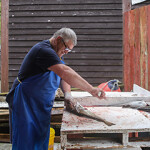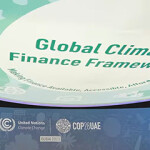Nutreco, Grieg, Tesco initiate program to halt soy-related deforestation in Brazil

Three big players in the seafood industry have announced a joint initiative to end soy-related deforestation in the Cerrado region of Brazil.
Amersfoort, the Netherlands-based Nutreco, one of the world’s largest aquafeed producers; Grieg Seafood, a salmon farming firm based in Bergen, Norway; and Tesco, a supermarket chain headquartered in Hertfordshire, England, have set up the “Funding for Soy Farmers in the Cerrado” initiative, which aims to provide financial incentives to farmers to produce soy only on existing agricultural land.
Each company will donate millions of dollars to the initiative, according to press releases from the companies.
“Soy cultivation is a key driver of deforestation in the Cerrado, an area recognized for its biodiversity and agricultural production. The Funding for Soy Farmers in the Cerrado Initiative will provide local soy farmers with financial incentives to expand soy cultivation in the Cerrado on existing agricultural areas. This will help protect the Cerrado’s forests and other natural habitats beyond what farmers already have to legally conserve under Brazil’s forest regulation," Grieg Seafood CEO Andreas Kvame said in a press release. “Although the soy we use in our salmon feed is certified and deforestation-free in and of itself, Funding for Soy Farmers in the Cerrado gives us an opportunity to make a greater industry impact further back in our value chain. The idea behind the initiative is that businesses with Brazilian soy in their value chain can contribute with this funding. We hope many international companies will join us, both in and outside the salmon sector.”
Located between the Amazon, the Atlantic Ocean, and the Pantanal, the Cerrado is the largest savanna region in South America, according to WWF. The Cerrado region is responsible for around 40 percent of Brazil’s fresh water, and is a globally significant area for carbon storage. However, in recent years, approximately 250 million metric tons of carbon have been released annually due to deforestation of the Cerrado – equivalent to the emissions of 53 million cars.
Tesco is set to donate GBP 10 million (USD 13.1 million, EUR 11.9 million) over the next five years, Nutreco has pledged to commit EUR 1 million (USD 1.1 million) annually to the fund for the next five years, and Grieg Seafood will contribute USD 2.00 (EUR 1.81) per ton of soy the company uses annually in its fish feed for five years.
“This initiative is a new breed of conservation protection, which recognizes responsible action by landowners interested in tackling climate-related issues especially in environmentally critical environments and biomes,” Nutreco CEO Rob Koremans said. “We are delighted to be working alongside Tesco and Grieg Seafood to protect the Cerrado and prevent further deforestation in the area. Soy is a key ingredient in global animal and aquaculture feed production and I hope that other companies, particularly within the feed industry, will come forward and commit to this initiative over the coming months.”
According to agricultural estimates, there are currently 22 million hectares of additional agricultural land in the Cerrado suitable for soy expansion – enough to double current soy production in the Cerrado without further deforestation. However, preliminary studies show that a total of USD 250 million (EUR 225.8 million) is needed to reach this goal, according to Nutreco.
“Preserving forests is one of the biggest challenges for developing countries like Brazil. We are aware of the importance of native vegetation to maintaining rainfall regimes, as forests control climate through evapotranspiration. Brazil's role in favor of the Amazon has been closely watched internationally and the country's reputation for agriculture will depend on maintaining high levels of production in an environmentally sustainable manner,” Gabriel Couto, a soy farmer in the Cerrado, said in a press release. “Thus, payments are a direct way to curb deforestation. For the farmer who is not yet aware of the global importance of forests, this incentive would give him a direct economic reason to contribute to the preservation of his reserves.”
Environmental groups including the WWF and the Rainforest Foundation have backed the initiative.
“Private-sector initiatives like this can provide the critical finance needed to support farmers while we transition to new business models and mechanisms that produce much-needed food and protect not only the Cerrado but similar habitats around the world,” WWF U.S. Senior Vice President of Markets Jason Clay said.
Nils Hermann Ranum, head of the Zero Deforestation Program of the Rainforest Foundation Norway, said the initiative represented a positive step forward.
“It’s great to see companies are committing to help stop deforestation from soy in Brazil and demonstrate a willingness to contribute financially to this crucial goal,” he said. “The world needs an effective mechanism to stop deforestation, combined with the companies pledging to buy soy exclusively from deforestation-free suppliers. If we are to succeed in our efforts to save the forest and stop climate change, it is crucial that companies with soy in their value chain take responsibility.”
Deomar, a soy farmer in the Mato Grosso area of the Cerrado, said the burden should not fall on Brazilians alone to bear the cost of preserving the country’s forests.
“Brazilian agriculture in the Cerrado regions carries very large burdens in relation to the maintenance of reserves. The farmer bears this cost for the benefit of the whole community, which receives benefits not only from the food production, but also from all the environmental services generated,” he said. “There is an urgent need for society to be aware of this issue and understand that such a burden should be shared amongst all, given the social benefits that preserving the environment brings.”
Photo courtesy of Grieg Seafood





Share